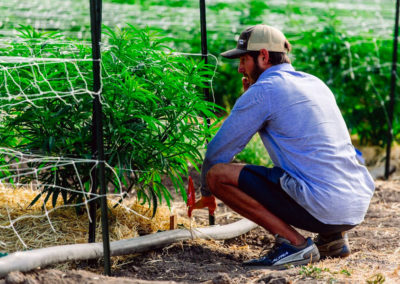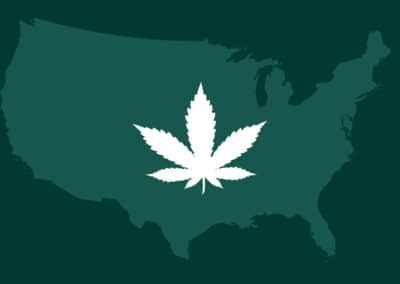Hemp Farming Laws in Each State
You, Too, Can Grow Hemp! Part 2
Welcome to part two of our ultimate guide to hemp farming laws. Find Part 1 right here: Hemp Farming Laws Part 1. In this guide, you will find key information about hemp farming laws, from Montana to Wyoming — sourced from your favorite autoflower feminized seed company! The hemp industry is projected to exponentially grow over the course of the next year as new states hop online. If you’re one of those farmers looking to start cultivating hemp, this guide is for you.
States must follow federal guidelines set by the 2018 Farm Bill, but each state’s program is structured differently. Our hemp growing guide illuminates some of those state by state and provides useful resources and information regarding everything from regulations, to hemp seed certification, to residency requirements. Check out this guide to see where your state stands on hemp growing and where you can go from here! Don’t see your state on the list? Check out part one here! (link)
Montana
Status: Legal
In Montana, hemp cultivators must obtain a grow license through the department. Native peoples (Fort Belknap Indian Community (FBIC), Blackfeet Nation, and the Chippewa Cree of the Rocky Boy’s Reservation) have different requirements, in which they do not need to file with the state but instead through Fort Belknap Agriculture Office or Blackfeet Homeland Security Office. Currently, the hemp program is continuing to operate under the 2014 pilot program framework.
Helpful Resources:
Industrial Hemp Program: https://agr.mt.gov/Industrial-Hemp
Requirements for Sale of Live Plants: https://agr.mt.gov/Portals/168/Documents/IndustrialHemp/Hemp-Reqs-SaleofLivePlants.pdf
Nebraska
Status: Legal
In Nebraska, hemp growers need a cultivator license in order to grow. In order to process or handle hemp, those interested must obtain a process-handler license.
Helpful Resources:
Hemp FAQs: https://nda.nebraska.gov/hemp/faqs.html
State Hemp Plan: https://www.ams.usda.gov/sites/default/files/media/NebraskaStateHempPlan.pdf
Hemp Program Information: https://nda.nebraska.gov/hemp/index.html
Nevada
Status: Legal
Presently, Nevada’s hemp program is operating under its pilot program in which research is still being conducted before the greater population can enter the program.
Helpful Resources:
New Hampshire
Status: Illegal
New Hampshire has recently cleared a path to legalization, but currently no regulatory framework is in place to grow hemp. Once a framework has been established, growers will need to obtain a USDA license to grow.
Helpful Resources:
Hemp Production Update: https://extension.unh.edu/blog/hemp-production-new-hampshire-update#:~:text=We%20have%20news.,industrial%20hemp%20in%20New%20Hampshire.&text=New%20Hampshire%20is%20the%20first,published%20on%20October%2031%2C%202019.
New Jersey
Status: Legal
New Jersey is working on developing rules for its 2021 season. The program will provide licenses for different aspects of production. Growers will have to pay a base fee, and they will be subject to an additional amount per acre of hemp. The .3% THC threshold will apply to hemp plants cultivated in New Jersey.
Helpful Resources:
New Jersey Hemp Program: https://www.nj.gov/agriculture/divisions/pi/prog/nj_hemp.html
Rules Summary: https://www.nj.gov/agriculture/divisions/pi/pdf/NJHempProgramSummaryandRules.pdf
2020 Application: https://www.nj.gov/agriculture/divisions/pi/pdf/2020%20NJH%20Grower%20Application.pdf
New Mexico
Status: Legal
In New Mexico, hemp cultivation fees differ depending on whether the grow is indoors or outdoors. The program is currently developing more rules to ensure compliance with the USDA.
Helpful Resources:
Hemp Registration: https://www.nmda.nmsu.edu/hemp-registration/
New York
Status: Legal
New York’s hemp program also follows the .3% THC threshold regulation. Hemp growers must be licensed to cultivate in the state of New York.
Helpful Resources:
Industrial Hemp Growers: https://agriculture.ny.gov/plant-industry/industrial-hemp-growers
Hemp Program Guidance 2021: https://agriculture.ny.gov/system/files/documents/2020/10/hemp_program_guidance_2021.pdf
North Carolina
Status: Legal
North Carolina’s hemp program is currently operating under its pilot program. Growers must have a license to cultivate hemp and private cultivation is illegal. In terms of sourcing seeds, the program leaves this up to the grower. Hemp cultivation’s future in North Carolina is currently uncertain because no plan was sent to the USDA for review.
Helpful Resources:
Hemp Program: https://www.ncagr.gov/hemp/
North Dakota
Status: Legal
Cultivation of hemp requires a license in North Dakota. In order to successfully obtain a license, growers must submit a hemp pilot project proposal in addition to the application.
Helpful Resources:
Hemp Program: https://www.nd.gov/ndda/plant-industries/hemp
Application: https://ole.ndda.nd.gov/login?next=hempprojects/
Hemp Pilot Project Proposal:
https://www.nd.gov/ndda/sites/default/files/resource/60963HempProposal_1.pdf
Ohio
Status: Legal
2021 grow applications are now available. Ohio growers must have a license in order to cultivate hemp. The ODA runs a surveillance program, which tests products from producers out of state to ensure Ohio standards are met.
Helpful Resources:
Hemp FAQs: https://agri.ohio.gov/wps/portal/gov/oda/divisions/hemp-program/faqs/questions
Oklahoma
Status: Legal
Oklahoma growers must obtain a license to produce hemp in the state. Hemp operations must be for research and development purposes. There are certain requirements to identify seeds to grow industrial hemp in Oklahoma. Operations must complete and submit a harvest report 30 days prior to harvest.
Helpful Resources:
Application: http://www.oda.state.ok.us/cps/Okla_Hemp_Pilot_Program_License_App.pdf
Hemp Laws, Rules, and Regulations: http://www.oda.state.ok.us/cps/IndustrialHempLawRule.pdf
Oregon
Status: Legal
Hemp grown in Oregon is subject to the .3% THC threshold. Growers must meet license requirements in order to cultivate. In Oregon, hemp seed producer registration is separate from the grower license. If producers decide to retain seeds, they must ensure that hemp seeds are from plants that did not yield over .3% THC hemp plants. Operations must maintain records for not less than 3 years.
Helpful Resources:
Hemp Growers Resources: https://www.oregon.gov/oda/programs/Hemp/Pages/HempGrowers.aspx
Pennsylvania
Status: Legal
Cultivators in Pennsylvania must apply and receive a permit to grow hemp plants. Pennsylvania’s hemp program is regulated by several different state entities. There are no limits in planting amounts, unlike some other states.
Helpful Resources:
Rhode Island
Status: Legal
Hemp is legal to cultivate in Rhode Island as long as it adheres to the .3% THC threshold. Licenses are available as public records in a database. These licenses are issued for specific locations and activities and remain valid for two years. In Rhode Island, growers may only receive products from other certified grower sources.
Helpful Resources:
Hemp Regulations: https://rules.sos.ri.gov/regulations/part/230-80-10-1
South Carolina
Status: Legal
In South Carolina, there are separate licenses for hemp growers and processors. There is also a hemp handlers license, which includes activities such as lab, transport, warehouse and hemp seed dealing. Growers must ensure that their product meets the .3% THC requirement. In order to sell to other farmers, there is a live plant certification that must be obtained. Hemp grower applications are available in the early part of the year.
Helpful Resources:
Hemp FAQs: https://agriculture.sc.gov/faq/hemp/
South Dakota
Status: Legal (Development Phase)
South Dakota’s hemp program is currently under development. As of this year, $3.5 million has been allocated to develop the industrial hemp program in South Dakota.
Tennessee
Status: Legal
In order to grow hemp, cultivators must obtain a license. Licenses are not required for hemp processing. Hemp grow applications are open at any time. Seed sellers must obtain a license in order to sell hemp seeds.
Helpful Resources:
Hemp FAQs: https://www.tn.gov/agriculture/farms/hemp-industry/hemp/getting-started.html
https://www.tn.gov/content/dam/tn/agriculture/documents/industrial-hemp/updated_hemp_application.pdf
Seed Seller License: https://www.tn.gov/agriculture/businesses/inputs/forms.html
Texas
Status: Legal
Hemp growers must obtain a cultivation license to grow in Texas. Cultivators must watch the hemp orientation video on the Department of Agriculture webpage in order to apply. On the department website, growers will have access to a list of approved hemp varieties able to be grown in Texas.
Helpful Resources:
Hemp Plan: https://www.ams.usda.gov/sites/default/files/media/TexasDeptofAgHempPlan.pdf
Hemp Regulations: https://www.texasagriculture.gov/RegulatoryPrograms/Hemp.aspx#:~:text=Now%20that%20the%20TDA%20plan,online%20on%20March%2016%2C%202020
Utah
Status: Legal
For those looking to grow in Utah, there is a lengthy process that must take place before submitting an application for a license. Steps include submitting a legal description and aerial photo of the grow area and testing the area’s soil, among others. More information can be found in the link below!
Helpful Resources:
Hemp Licensing Information: https://ag.utah.gov/documents/HempLicensingInformation.pdf
Vermont
Status: Legal
In order to grow, Vermont cultivators must complete a registration. Producers do not need a registration to sell. Personal use growing is allowed in the state of Vermont. If growing for personal use, sale is not permitted. Growers must adhere to the .3% THC threshold. All documentations and forms must be completed in order to qualify for registration.
Helpful Resources:
Registration: https://agriculture.vermont.gov/public-health-agricultural-resource-management-division/hemp-program/hemp-program-registration
Hemp Registration FAQs: https://agriculture.vermont.gov/sites/agriculture/files/documents/PHARM/hemp/Grower_registration_FAQ.pdf
Virginia
Status: Legal
In Virginia, grow operations may occur, but cultivators must register in order to qualify. Hemp growers are subject to testing to ensure compliance.
Helpful Resources:
Registration Guide: https://www.vdacs.virginia.gov/pdf/Hemp%20PDFS/registration-guide.pdf
Industrial Hemp: https://www.vdacs.virginia.gov/plant-industry-services-hemp.shtml
Grower Application: https://www.vdacs.virginia.gov/pdf/Hemp%20PDFS/grower-registration-application.pdf
Washington
Status: Legal
Licensure is required to grow hemp in the state of Washington. Washington’s agricultural department website urges hemp growers to forge relationships with processors beforehand, so that growers may have somewhere to sell their products. Washington state does not have any minimum or maximum field size requirements.
Helpful Resources:
Hemp FAQs: https://agr.wa.gov/departments/agricultural-products/hemp/hemp-faq
Washington D.C.
Status: No Law in Place
Though hemp growth isn’t necessarily illegal in Washington D.C., the District does not regulate the production, sale, processing or possession of hemp.
West Virginia
Status: Legal
In order to grow hemp in West Virginia, growers must adhere to the .3% THC threshold as in other states. Included below is the application for the 2021 grow season, as an example. The application period has already passed.
Helpful Resources:
2021 Application: https://agriculture.wv.gov/wp-content/uploads/2020/09/2021-Hemp-App-Instruction-Letter.pdf
Hemp Fact Sheet: https://agriculture.wv.gov/wp-content/uploads/2020/10/Hemp-Fact-Sheet-5-19.pdf
Wisconsin
Status: Legal
There is not a resident requirement to grow hemp in the state of Wisconsin. Hemp cultivators must obtain a license through the Department of Agriculture and the operational site must be in the state. There is not a minimum field requirement, but growers must have a minimum of 15 female plants in order for the state to test samples to ensure compliance.
Helpful Resources:
Hemp FAQs: https://datcp.wi.gov/Documents/HempFAQLicensing.pdf
Wyoming
Status: Legal
In Wyoming, individuals and businesses can apply to receive a hemp grow license. Wyoming adheres to the .3% THC threshold like other states. For each acre of land, at least 1 plant will be tested to ensure licensees are following guidelines.
Helpful Resources:
Hemp Testing Guidelines: https://wyagric.state.wy.us/images/stories/pdf/techserv/hemptest.pdf License Application: https://wyagric.state.wy.us/images/stories/pdf/techserv/hemp/hemplicenseapp.pdf


